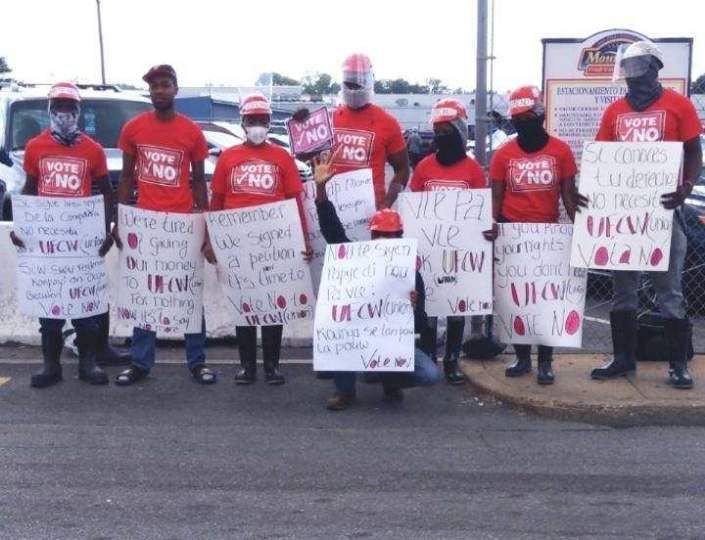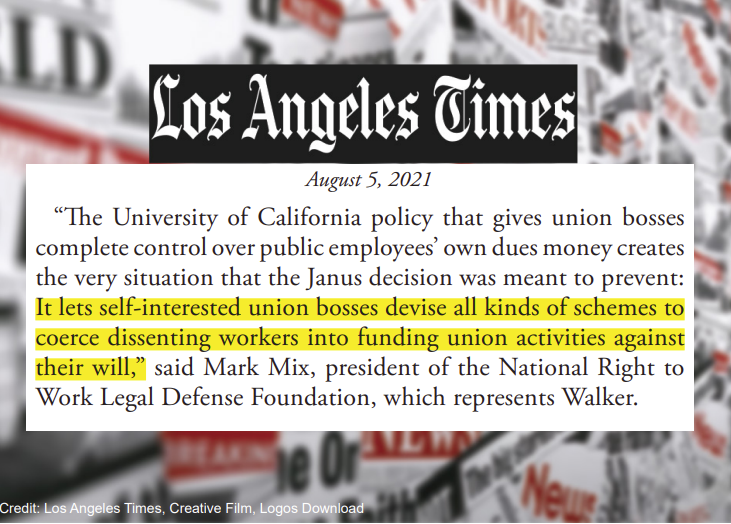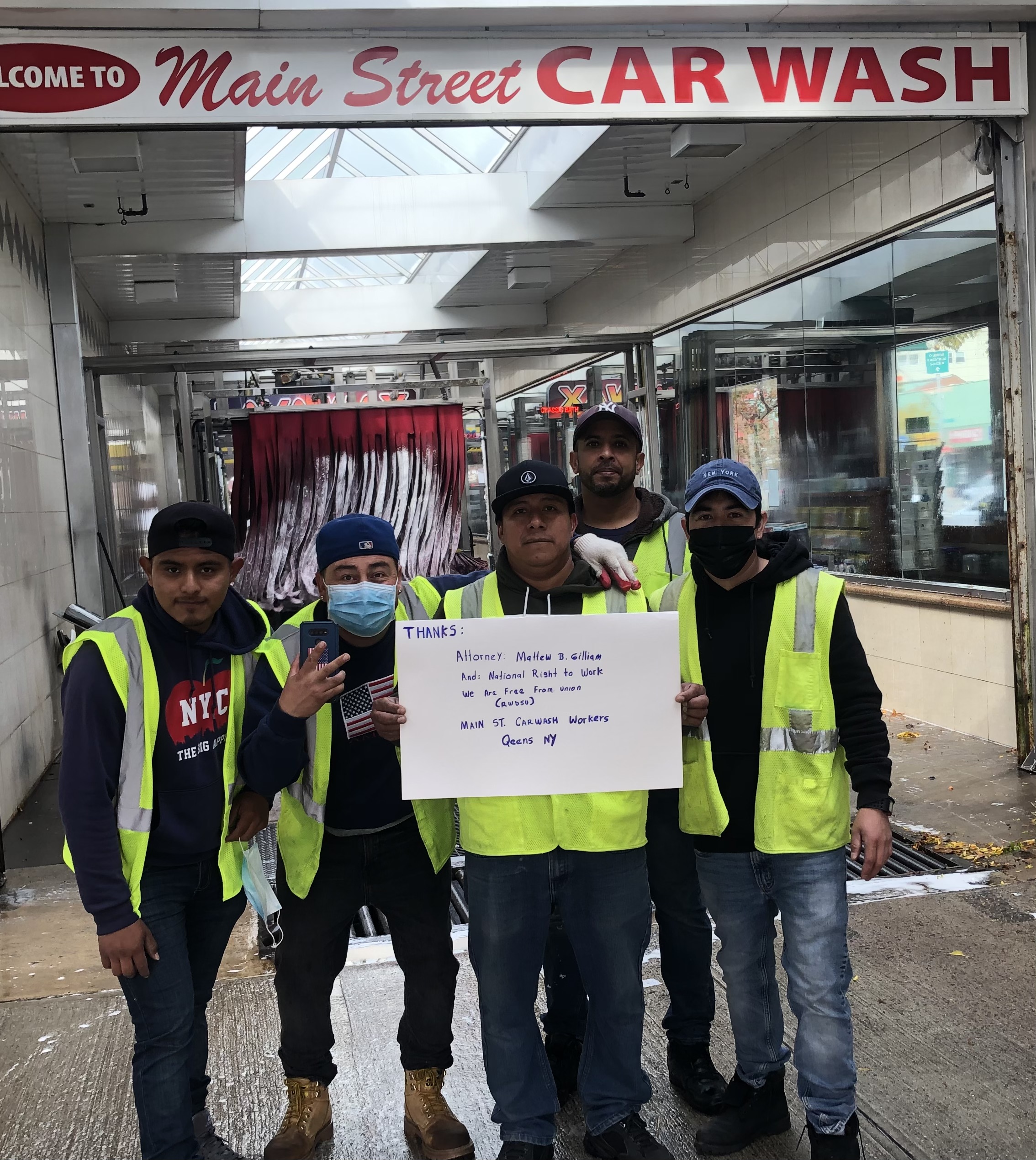After 18 Months, Mountaire Farms Workers Finally Oust Union
The following article is from the National Right to Work Legal Defense Foundation’s bi-monthly Foundation Action Newsletter, March/April 2022 edition. To view other editions of Foundation Action or to sign up for a free subscription, click here.
Overwhelming vote against UFCW follows NLRB shredding of first ballots
Employees at Mountaire Farms in Delaware fought “contract bar” delays from tyrannical UFCW union officials for almost two years. Finally, they’ve overwhelmingly voted out the union.
SELBYVILLE, DE – Almost two years after their initial attempt, Mountaire Farms poultry employees in Delaware have decisively voted to remove United Food and Commercial Workers (UFCW) union officials from their workplace. The drawn-out ordeal demonstrates how the “contract bar,” a controversial National Labor Relations Board (NLRB) policy, unjustly traps workers in union ranks they oppose.
Under the National Labor Relations Act (NLRA), the federal statute the NLRB implements, workers possess an enumerated statutory right to remove an unwanted union through a decertification election. However, the NLRB has invented out of whole cloth a “contract bar.” The “contract bar” halts workers’ right to hold a decertification election to remove a union they oppose for up to three years after union officials and a company finalize a monopoly bargaining contract.
NLRB Chucks Workers’ Votes Citing ‘Contract Bar’
Mountaire Farms workers voted in an NLRB-supervised decertification election in June 2020, but UFCW lawyers appealed the case to the full Labor Board in Washington, D.C., and were able to get the ballots impounded. After a divided NLRB ruled for the union bosses in April 2021, hundreds of cast ballots were destroyed without being counted.
The June 2020 vote was requested by Mountaire employee Oscar Cruz Sosa, who received free legal representation from National Right to Work Legal Defense Foundation staff attorneys. Cruz Sosa had the support of hundreds of his coworkers when he submitted his petition to the NLRB requesting a vote.
Initially, an NLRB regional official rejected union arguments that the decertification effort was blocked due to the “contract bar,” and the election was held. However, UFCW union lawyers appealed that decision to the full Board, which impounded the ballots while the appeal was considered.
Cruz Sosa’s Foundation attorneys urged the Board to reject the UFCW’s attempt to impose the “contract bar.” More importantly, they urged the Board to eliminate the bar completely because it is not found in the text of the NLRA, and serves only to protect unpopular union bosses from worker accountability. As the brief filed by Foundation staff attorneys pointed out, the only “bar” in the text of the NLRA states that workers must wait one year after an election before holding another vote, making the threeyear “contract bar” particularly egregious.
Nevertheless, in an April 2021 ruling, a divided Board sided with union lawyers, upheld the “contract bar,” and threw out the ballots cast by workers at the 800-employee facility. As a result, the employees were forced to wait almost another year, all the while subjected to forced union dues, for the “contract bar” to expire so they could restart the process for a decertification election.
Finally, without the barrier of the NLRB’s “contract bar” policy the workers submitted another petition to hold a vote to remove the UFCW in October 2021.
Landslide Vote Against Union Highlights Injustice of Anti-Worker ‘Contract Bar’ Policy
In the subsequent vote that concluded in December 2021, the workers overwhelmingly rejected the union with 356 of 436 votes counted for removing the union. The workers are finally free of unwanted union “representation,” nearly two full years after they started their effort to remove the union, which was highly unpopular among rank-and-file Mountaire Farms employees.
“The overwhelming final vote tally emphasizes the injustice of the decision to continue the Board-invented ‘contract bar,’ which resulted in the destruction of hundreds of ballots. From the outset it was clear how little support UFCW officials really had,” observed National Right to Work Foundation Vice President and Legal Director Raymond LaJeunesse. “This case is yet another example of how the NLRB has twisted the law to protect union boss power at the expense of the statutory rights of rank-and-file employees.”
“We’re under no illusions that the Biden NLRB, stacked with former union officials, will end this longstanding impediment to workers’ right to free themselves of an unwanted union. But this saga demonstrates why the injustice that is the non-statutory ‘contract bar’ must be ended by a future Board,” LaJeunesse added.
Casino Worker Challenges Order Installing Unwanted Union via ‘Card Check’
The following article is from the National Right to Work Legal Defense Foundation’s bi-monthly Foundation Action Newsletter, March/April 2022 edition. To view other editions of Foundation Action or to sign up for a free subscription, click here.
Ninth circuit panel signals willingness to end precedent allowing for imposition of union
NLRB officials stacked the deck against rank-and-file Red Rock Casino employees by imposing an unpopular union on them despite worker objections.
LAS VEGAS, NV – A large majority of the workers at Red Rock Casino in Las Vegas, Nevada voted “no” to unionization, but a federal district court judge ordered their employer to bargain with union officials anyway. Casino officials appealed, and Red Rock employee Raynell Teske supported their efforts to overturn the judge’s coercive order that overrides the choice workers made at the ballot box.
With free Foundation legal aid, Teske filed a brief arguing that the district judge had no reason to impose a union onto workers who had already soundly voted to reject it. A Ninth Circuit panel denied the initial appeal, but issued an unusual concurring opinion in which all three judges said they disagreed with that outcome, but were bound by Ninth Circuit precedent to uphold the district judge’s order.
Binding precedent can only be overturned through an en banc hearing before a larger Ninth Circuit panel. Red Rock lawyers filed for an en banc rehearing of their appeal. The court then ordered National Labor Relations Board (NLRB) lawyers defending the order to respond, another signal the judges may be willing to overturn this ridiculous precedent and rule in the workers’ favor. Teske filed a second amicus brief, urging the court to hear the case en banc.
Judge Overrides Workers’ Vote Against Union ‘Representation’
The situation at Red Rock began in December 2019, when the NLRB held a secret-ballot election on whether to unionize the Casino’s workers. Employees rejected union officials’ effort to become their monopoly bargaining “representatives” in an NLRB-supervised vote by a nearly 100-vote margin. Despite that outcome, NLRB Region 28 Director Cornele Overstreet sought a federal court injunction imposing the union over the workers’ objections.
On July 20, 2021, District Judge Gloria Navarro agreed with the NLRB Director’s request, and ordered Red Rock to bargain with union officials despite the employees’ vote against unionization. The judge said the order was justified because union officials claimed that, before the vote, a majority of workers had signed union authorization cards.
Teske’s amicus briefs argue those “Card Check” signatures don’t prove that union officials ever had majority support. She contends the level of union support was tested fairly by the secret-ballot election, in which workers voted 627-534 against unionization.
Her briefs point out that the NLRB and federal courts have long recognized that secret ballots are a more reliable way of gauging worker support for a union, because workers are often pressured, harassed, or misled by union organizers into signing cards.
Union officials know that Card Check signatures do not indicate solid worker support. The AFL-CIO admitted in its internal organizing handbook that it needed at least 75% Card Check support before having even a 50-50 chance of winning a secret-ballot election. Union bosses prefer Card Check unionization because they can more easily take control of workplaces where they lack popular support, and partisan NLRB appointees now are working to grant their wish.
Partisan NLRB Pushes Unreliable ‘Card Check’
Past legislative attempts to enact Card Check unionization, including the so-called “PRO Act,” pending in the U.S. Senate right now, faced bipartisan opposition. However, NLRB General Counsel Jennifer Abruzzo, a former high-ranking union lawyer, believes she can implement Card Check without congressional approval. Abruzzo has expressed interest in resurrecting a decades-old NLRB doctrine that allows unions to sue employers to try to force them to automatically bargain whenever the union possesses a pile of untested union cards.
“There is no reason why district court judges or NLRB bureaucrats should be able to override workers’ choice at the ballot box,” said National Right to Work Foundation Vice President Patrick Semmens. “A favorable ruling for Raynell Teske and her colleagues could provide legal ammunition for future workers if the NLRB tries to force them to accept union officials for whom they never even had a chance to vote.”
NYC University Professors Take Aim at Forced Union ‘Representation’
The following article is from the National Right to Work Legal Defense Foundation’s bi-monthly Foundation Action Newsletter, March/April 2022 edition. To view other editions of Foundation Action or to sign up for a free subscription, click here.
CUNY professors’ lawsuit argues NY law forces them under power of anti-Semitic union
Prof. Avraham Goldstein recalled in a Wall Street Journal piece the anti-Semitism his family faced in the Soviet Union. He and other plaintiffs argue they shouldn’t be forced to associate with a union that subjects them to similar hostility.
NEW YORK, NY – For decades, government sector union bosses have relied on two pillars of coercion — forced dues and forced representation — to maintain their grip on power over America’s public servants and the public services citizens rely on.
While the Supreme Court in the 2018 National Right to Work Foundation-won Janus v. AFSCME Supreme Court case recognized that forcing government employees to pay dues to stay employed violates the First Amendment, a new Foundation-assisted civil rights lawsuit from six City University of New York (CUNY) system professors may finally defeat union bosses’ privilege to impose union representation over the objections of public workers.
CUNY professors Jeffrey Lax, Michael Goldstein, Avraham Goldstein, Frimette Kass-Shraibman, Mitchell Langbert, and Maria Pagano sued the AFL-CIO-affiliated Professional Staff Congress (PSC) union, CUNY executives, and New York State officials in January, challenging New York State’s “Taylor Law” that gives unions monopoly bargaining privileges in public sector workplaces like CUNY.
The plaintiffs, most of whom are Jewish, oppose the union’s “representation” on the grounds that union officials and adherents have relentlessly denigrated their religious and cultural identity. Several of the plaintiffs exercised their Janus right to cut off dues after PSC officials rammed through a resolution in June 2021 that they found “anti-Semitic, anti-Jewish, and anti-Israel,” according to the lawsuit.
Discrimination Cited in Groundbreaking First Amendment Case
The lawsuit, which was filed with legal aid from both the National Right to Work Foundation and Pennsylvania-based Fairness Center, says: “Despite Plaintiffs’ resignations from membership in PSC, Defendants . . . acting in concert and under color of state law, force all Plaintiffs to continue to utilize PSC as their exclusive bargaining representative.”
The resolution is not nearly the worst example of PSC officials’ anti-Semitism, according to the lawsuit. Prof. Michael Goldstein asserts that adherents of PSC are waging a campaign to get him fired and have targeted him with harassment and threats such that he must have an armed guard accompany him on campus. Prof. Lax cites in the lawsuit a determination he has already received from the Equal Employment Opportunity Commission (EEOC) that “PSC leaders discriminated against him, retaliated against him, and subjected him to a hostile work environment on the basis of religion.”
While all of the professors take issue with PSC bosses’ radicalism, they also want to break free from internal conflicts within the large and disparate unit, which consists of full-time, part-time, and adjunct teaching employees and others. Prof. Kass-Shraibman states in the lawsuit that “instead of prioritizing the pay of full-time faculty, PSC expended resources advocating on behalf of teachers in Peru, graduate students at various other universities and the so-called ‘Occupy Wall Street’ movement.”
On top of all that, Profs. Avraham Goldstein, Kass-Shraibman, and Langbert contend that PSC officials aren’t even respecting their First Amendment Janus rights. Although all three professors clearly indicated they wanted to cut off financial support to the union, the lawsuit explains that “Defendants PSC and the City . . . have taken and continue to take and/or have accepted and continue to accept union dues from [their] wages as a condition of employment . . .” in violation of Janus.
“I had paid thousands of dollars in union dues for workplace representation, not for political statements or attacks on my beliefs and identity,” Prof. Avraham Goldstein wrote in a piece for The Wall Street Journal. “I decided to resign my union membership and naively thought I could leave the union and its politics behind for good.”
“I was wrong,” recounted Prof. Goldstein. “Union officials refused my resignation and continued taking union dues out of my paycheck.”
Suit Seeks Damages and to Overturn NY Law Authorizing Union Control
The lawsuit seeks a declaration from the U.S. District Court for the Southern District of New York that the Taylor Law’s imposition of monopoly union control is unconstitutional, and that the defendants cease “certifying or recognizing PSC, or any other union, as Plaintiffs’ exclusive representative without their consent.” The lawsuit also demands the union and university return dues seized in violation of Janus to Profs. Avraham Goldstein, Kass-Shraibman, and Langbert.
“By forcing these professors into a monopoly union collective against their will, the state of New York mandates that they associate with union officials and other union members who take positions that are deeply offensive to these professors’ most fundamental beliefs,” observed National Right to Work Foundation President Mark Mix. “New York State’s Taylor Law authorizes such unconscionable compulsion. It is time federal courts fully protect the rights of government employees to exercise their freedom to disassociate from an unwanted union, whether their objections are religious, cultural, financial, or otherwise.”
UC Irvine Lab Assistant Beats CWA Bosses in Suit Fighting Anti-Janus Schemes
The following article is from the National Right to Work Legal Defense Foundation’s bi-monthly Foundation Action Newsletter, January/February 2022 edition. To view other editions of Foundation Action or to sign up for a free subscription, click here.
Settlement secures full dues refund, ends phony photo ID restriction on Janus rights
Foundation President Mark Mix was quoted in a Los Angeles Times report on the filing of Amber Walker’s lawsuit, emphasizing how UC’s pro-union boss policies were designed to infringe on workers’ right to decide freely on union support.
IRVINE, CA – Just a few months after University of California Irvine lab assistant Amber Walker slammed them with a federal lawsuit, University Professional and Technical Employees (UPTE-CWA) union officials have already backed off of defending schemes created to stop university employees from exercising their First Amendment right to stop union dues takings.
In November, National Right to Work Foundation staff attorneys won a settlement against UPTE officials requiring them to abandon their arrangement that required employees to provide a photo ID just to cut off unwanted union financial support. The settlement also made UPTE officials return to Walker dues they had seized from her wages under the scheme.
The lawsuit, filed by Foundation staff attorneys in August, challenged the use of a California statute that makes public employers completely subservient to union officials on dues issues. Union officials set up a system to stymie public employees’ right to stop dues payments that, according to Walker’s lawsuit, violated both due process and the First Amendment.
Lawsuit: Union Bosses Layered Two Schemes to Block Janus Rights
Walker sought to safeguard her First Amendment rights recognized by the U.S. Supreme Court in the landmark Foundation-won Janus v. AFSCME decision. In Janus, the Court declared that forcing public sector workers to fund unions as a condition of employment violates the First Amendment. The Justices also ruled that union dues can only be taken from a public employee with an affirmative and knowing waiver of that employee’s First Amendment right not to pay.
“Before pursuing a lawsuit against UPTE, I tried to voice my concerns to many different officials in the union organization,” Walker told a Los Angeles Times reporter. “Many just ignored my plea and one official even raised their voice and rudely hung up the phone in my face . . . I believe it should not have taken a lawsuit to make UPTE respect my constitutional rights.”
Walker’s lawsuit explained that she sent UPTE union bosses a letter in January 2021 exercising her right to end her union membership and all union dues deductions from her wages. Walker submitted this message within a short union created “escape period” imposed to limit when workers can revoke dues deductions. The union bosses still rebuffed her request, telling her she needed to mail them a copy of a photo ID to effectuate her revocation. The photo ID requirement, clearly adopted to frustrate workers’ attempts to exercise their constitutional rights, is mentioned nowhere on the dues deduction card Walker had signed to initiate dues payments.
By the time UPTE officials had informed Walker that her request to cut off dues was rejected for lack of photo ID, the “window period” they enforce had already elapsed. Had Walker not filed a lawsuit with free Foundation legal aid, UPTE officials likely would have continued siphoning money from her paycheck for at least another year until the arrival of the next “window period.”
Rather than face Foundation staff attorneys in court, UPTE bosses backed down and chose to settle the lawsuit. The settlement requires UPTE officials to stop taking money from Walker’s paycheck and to refund any deductions they took after her initial attempt to exercise her Janus rights. They must also desist from enforcing the photo ID requirement.
The Foundation is aiding other public sector workers across the country in defending their First Amendment right to refuse union financial support.
Fight to Eliminate Pernicious Restrictions on Janus Continues at High Court
In October, Foundation staff attorneys filed two joint petitions urging the Supreme Court to take cases brought for Alaska, Oregon, and California public servants who are battling restrictive “escape period” schemes union bosses manipulated to stop them from opting out of supporting unwanted union activities (See Page 2).
“We at the Foundation are glad to have helped Ms. Walker reclaim dues that were illegally siphoned from her wages by UPTE union bosses, but hardworking public servants like Ms. Walker should not be forced to file federal lawsuits just to exercise their basic First Amendment rights of free association,” commented National Right to Work Foundation Vice President Patrick Semmens. “The fact that UPTE bosses backed so quickly off defending their own suspect behavior indicates that they apparently knew their schemes would not stand up to any serious constitutional scrutiny.”
Tennessee Worker Takes LIUNA Bosses to Federal Court for Religious Discrimination
The following article is from the National Right to Work Legal Defense Foundation’s bi-monthly Foundation Action Newsletter, January/February 2022 edition. To view other editions of Foundation Action or to sign up for a free subscription, click here.
To justify forced dues union official sent ‘remedial church readings’ to employee, her priest
Instead of just granting Dorothy Frame a religious accommodation as federal law requires, LIUNA union bosses disparaged her faith.
CLARKSVILLE, TN – Dorothy Frame, who works at a hospital at Tennessee’s Fort Campbell, asked for a federally required religious accommodation over two years ago so she didn’t have to pay dues to Laborers International Union of North America (LIUNA) bosses in her workplace. Since then, LIUNA union bosses have ridiculed her faith, seized dues from her wages even after she requested an accommodation, and refused to give back funds they took from her in violation of her rights.
Now, with free legal representation from National Right to Work Foundation staff attorneys, Frame has hit LIUNA bosses with a federal lawsuit for violating her rights. Her lawsuit charges the union with religious discrimination for siphoning dues from her paycheck when union officials knew doing so violated her religious beliefs. The lawsuit also charges the union with religious harassment for threatening to fire her if she didn’t submit union dues in contradiction to her beliefs.
LIUNA Officials Brazenly Ridiculed Beliefs of Employee and Her Priest
Frame gave the union a letter in July 2019 requesting a religious accommodation, her lawsuit says. It included a message from her parish priest backing her position. Federal law prohibits union officials from discriminating against employees on the basis of religion. Accommodations of religious objections to dues payment often consist of permitting a dissenting worker to instead contribute the dues amount to a mutually agreed upon charity.
Even though Tennessee is a Right to Work state, union officials claim that Fort Campbell is a “federal enclave” not subject to state law. Frame’s employer (J & J Worldwide Service) and LIUNA maintain a contract that forces workers to pay union dues to stay employed.
A response to Frame’s letter from a LIUNA lawyer came the following month, her lawsuit notes, attacking her accommodation request and demanding that she “prove that her beliefs ‘[]meet the standard for a “legitimate justification.”’” The union lawyer also claimed that Ms. Frame’s understanding of her faith was inferior to his own understanding of her faith and even closed the letter by “sending Ms. Frame — and her priest — remedial church readings.”
One of Frame’s attorneys sent a letter in reply demonstrating how the accommodation request conformed to various church teachings. Nonetheless, LIUNA bosses continued to take dues from Frame’s paycheck.
Frame then filed a discrimination charge against LIUNA with the Equal Employment Opportunity Commission (EEOC). Even after EEOC proceedings and additional letters from her attorney demonstrating the union’s various forms of support for causes and ideas she objected to, Frame’s lawsuit explains, union officials still refused to accommodate her. LIUNA bosses also “refuse to return any money they collected from Ms. Frame” since she sought an accommodation.
Employee Seeks Damages for Emotional Pain Caused by Union Discrimination
Frame’s lawsuit asks that the court declare “she has the right to a religious accommodation that alleviates her obligation to join or support the Unions” and order that LIUNA return all money seized from her wages in violation of her religious beliefs, plus pay “damages for emotional pain, suffering, and mental anguish that she suffered because the Unions repeatedly challenged and disparaged her religious beliefs.”
Frame is a Catholic who staunchly opposes LIUNA union officials’ position on abortion. “Ms. Frame believes that abortion is a grave sin,” her lawsuit details. “She believes joining or financially supporting the Unions would make her complicit in that sin because she believes that the Unions support and promote abortion. Thus, she believes that any money the Unions collect from her makes her complicit in sin and violates her religious beliefs.”
“LIUNA officials have put their arrogance and callousness on full display by forcing Ms. Frame to choose between losing her job and severely compromising her religious beliefs,” commented National Right to Work Foundation President Mark Mix. “Denying an individual a simple religious accommodation clearly violates federal law, and Foundation attorneys will fight for Ms. Frame until she is accommodated.”
“Big Labor’s government-granted privilege to force fees out of workers as a job condition allowed this kind of abuse to happen — no American worker should be forced to subsidize unwanted union activities just to keep his or her job,” Mix added.
NYC Car Wash Workers Kick Out Unwanted RWDSU Union Officials
The following article is from the National Right to Work Legal Defense Foundation’s bi-monthly Foundation Action Newsletter, January/February 2022 edition. To view other editions of Foundation Action or to sign up for a free subscription, click here.
Union bosses rejected by Alabama Amazon workers now ousted by car wash employees
Main Street Car Wash worker Ervin Par (center) and his colleagues in NYC thank their National Right to Work Foundation attorney for helping them secure a vote to remove unwanted RWDSU union bosses from their workplace.
NEW YORK, NY – In 2018, Ervin Par, an employee of Main Street Car Wash in Queens, NY, explained why he and his coworkers overwhelmingly wanted Retail, Wholesale, and Department Store Union (RWDSU) officials out of their workplace: “They just come and collect their fees, but I don’t see an economic benefit from the union.”
“Among my colleagues, there’s a majority that doesn’t want the union,” Par told Reason magazine in an interview at the time. Now, after a three-year effort to vote out RWDSU officials, Par and his coworkers have finally succeeded with free legal aid from National Right to Work Foundation staff attorneys.
Soon after Par submitted an October petition signed by enough of his coworkers to prompt the National Labor Relations Board (NLRB) to conduct an employee vote whether to eject the union, RWDSU officials filed paperwork ending their control over the facility. Notably, RWDSU union officials fled Main Street Car Wash before the NLRB had conducted the union decertification election for Par and his coworkers — likely in an attempt to avoid an embarrassing, overwhelming rejection in the vote.
Car Wash Employees Endured Years of Forced Dues, Union “Blocking Charges”
Par also rallied his coworkers in 2018 to oust the union, but their valid petition for a decertification election was thwarted by “blocking charges” from RWDSU officials. Because Par and his colleagues work in non-Right to Work New York, the delays meant that they were forced to pay dues to an unpopular union for almost three more years just to keep their jobs. In contrast, in Right to Work states all union financial support is strictly voluntary.
Par and his coworkers’ desire for freedom from union control is not uncommon. According to reports, in 2018 Main Street Car Wash was one of only six car washes in New York City still under union monopoly control, a number that had been declining following other union departures due to lack of employee support.
RWDSU Bosses Oppose Will of Rank-and-File Workers Across Country
The RWDSU is notably the same union that Bessemer, AL, Amazon employees rejected decisively during a highly publicized April 2021 union election. Despite that election loss, RWDSU officials are still trying to install themselves at the Bessemer facility. Litigation continues over whether RWDSU lawyers will nullify the workers’ vote in which barely 12% of eligible voters supported union bosses’ monopoly “representation.”
Atlanta, GA-area employees of water treatment company Ecolab have also recently received free Foundation legal assistance in their attempt to remove RWDSU officials.
“Mr. Par and his coworkers persevered for almost three years to end RWDSU union officials’ grip on power in their workplace,” commented National Right to Work Foundation Vice President Patrick Semmens. “Although we’re glad the employees have finally been able to exercise their right to remove RWDSU, union officials should not have been able to manipulate the rules to stifle the decertification effort for so long.”
“RWDSU union officials have a penchant for challenging the will of the very employees they claim to ‘represent.’” Semmens added. “Workers across the country who seek to remove unwanted RWDSU presence in their workplace should contact the Foundation for free legal aid in exercising their rights.”
Case Closed: Nurse Prevails in 11-Year Legal Fight Over Forced Dues
The following article is from the National Right to Work Legal Defense Foundation’s bi-monthly Foundation Action Newsletter, January/February 2022 edition. To view other editions of Foundation Action or to sign up for a free subscription, click here.
100 Rhode Island hospital employees win refund of dues illegally seized for union lobbying
After over a decade of battling power-hungry UNAP union bosses in court, Jeanette Geary has secured not only refunds of dues seized for union politics, but a First Circuit decision clarifying non-members can never be charged for union lobbying.
WARWICK, RI – Jeanette Geary finally achieved a total victory in her 11-year legal battle against union bosses. She and 99 other current and former nurses at Kent Hospital in Rhode Island received refunds of forced dues that were illegally used to support union lobbying in state legislatures. Foundation attorneys represented Geary throughout her fight.
Geary’s journey began when she grew frustrated with United Nurses and Allied Professionals (UNAP) union bosses in her workplace. “I realized what the union was doing,” Geary explained. “The union leadership had no interest in nurses or our professional work. Their only interest was collection of dues and fees.”
Geary resigned her union membership, but union dues were still extracted from her paycheck because Rhode Island is a forced unionism state that lacks Right to Work protections. However, thanks to the Foundation-won CWA v. Beck Supreme Court decision, nonmember workers can only be forced to pay fees for union activities “germane” to union monopoly bargaining. They cannot be forced to pay the portion of dues that funds activities like union lobbying.
Nurse Harassed for Standing Up to Union Bosses
Geary demanded a breakdown of the union’s expenditures, but union bosses refused to give her a legally required independent auditor’s verification of how they calculated non-members’ reduced forced fees. Like many who speak up against union bosses, Geary became a target for union harassment. “They laughed at me. They had their workplace reps ridicule me on the job and tell me I could file grievances that would be thrown away and said so with a big smile,” Geary recalled.
In 2009, Geary filed federal charges against union officials. The trial revealed UNAP officials were charging non-member nurses for lobbying in state legislatures. Despite the Supreme Court’s clear mandate in Beck that non-members’ money could not be used to fund political causes, union lawyers argued the lobbying was “germane” to the union’s monopoly bargaining.
Thanks to delays caused by President Obama’s illegal recess appointments to the National Labor Relations Board (NLRB), Geary had to file two petitions with the U.S.
Court of Appeals in Washington, D.C., and didn’t get a final NLRB ruling for nearly a decade. Finally, in March 2019, the NLRB ruled 3-1 that union officials cannot charge non-members for lobbying of any kind. It also ruled that union officials must provide independent verification that the union expenses they force non-members to pay have been audited.
Union Bosses Ridiculously Claimed Some Union Lobbying Wasn’t Political
Union officials still wouldn’t abandon their argument that nonmembers could be forced to pay for some union lobbying as a condition of employment. Union lawyers appealed the NLRB’s decision to the U.S. Court of Appeals for the First Circuit. A three-judge panel that included retired Supreme Court Justice David Souter ruled unanimously in Geary’s favor, saying “we see no convincing argument that legislative lobbying is not a ‘political’ activity.”
Union officials made a last-ditch attempt to overturn the decision, requesting an en banc hearing by the entire Court of Appeals, but that request was denied. In September 2021, union bosses finally paid back, with interest, thousands of dollars taken from Geary and 99 other current and former Kent Hospital nurses who were not union members but were charged for the union’s lobbying, bringing the decade-long case to a close.
“Jeanette Geary faced workplace ridicule for her decision to stand up to union bosses, yet she persevered for eleven years,” said National Right to Work Foundation Vice President and Legal Director Raymond LaJeunesse. “In the process, she won important legal precedents that will protect thousands of other workers from having their money illegally used to fund union politics.”
Nurses at Massachusetts Hospital Move to Boot Union After Divisive Strike
The following article is from the National Right to Work Legal Defense Foundation’s bi-monthly Foundation Action Newsletter, March/April 2022 edition. To view other editions of Foundation Action or to sign up for a free subscription, click here.
Union bosses caught red-handed illegally demanding dues from workers
Many St. Vincent Hospital nurses reported the MNA union’s 300+ day strike was filled with bullying and division. “Do we want to keep the MNA and continue that same behavior?” asked Nurse Richard Avola on Spectrum News 1.
WORCESTER, MA – Earlier this year, hundreds of nurses at St. Vincent Hospital in Worcester, MA, backed a petition to the National Labor Relations Board (NLRB), demanding a vote to oust Massachusetts Nurses Association (MNA) union officials from the facility. The effort followed a grueling, nearly year-long strike ordered by MNA bosses. As this issue of Foundation Action went to press, nurses were in the process of submitting ballots in the election.
Nurse Richard Avola submitted the petition to the NLRB in January. It contained enough employee signatures to trigger an NLRB-supervised decertification vote at the hospital. Soon after, he sought free legal aid from National Right to Work Foundation staff attorneys in defending the petition.
“People want change,” Avola told a Spectrum News 1 Worcester reporter in January about the push for a vote. “They want change for our patients.”
Protracted and Political Strike Rife with Intimidation, Many Nurses Report
Avola and his colleagues’ endeavor came after a 300-day strike ordered by MNA chiefs against the hospital — the longest strike in Massachusetts history. In response to inquiries from nurses impacted by the union bosses’ strike order, Foundation staff attorneys in March 2021 issued a legal notice informing St. Vincent nurses of their right to work during the strike and to cut off dues payments to the MNA hierarchy. The notice offered free legal aid to St. Vincent nurses who encountered union pushback in the exercise of their individual rights.
The union boss-ordered strike was intensely acrimonious. Union agents reportedly engaged in many harassing acts against nurses who exercised their right to continue working during the strike, including putting photographs of working nurses on strike paraphernalia and taking illicit pictures of nurses’ license plates. Despite the union-instigated campaign against rank-and-file nurses, high-profile elected officials, including U.S. Senators Ed Markey and Elizabeth Warren, vocally sided against nurses who continued treating patients while exercising their right to rebuff the union strike demands.
MNA Union Agents Admitted to Illegally Demanding Union Dues During Strike
As the push for a vote to decertify MNA gained momentum, evidence emerged that union officials had demanded dues payments from nurses for periods during the strike when no contract existed between hospital management and the MNA union. Demanding dues during a contract hiatus is forbidden by longstanding federal law.
In response, St. Vincent nurse Regina Renaud hit the MNA union with Foundation-backed federal charges in January, maintaining that MNA agents had sent such illegal demands to her and other nurses. Just one day after Renaud filed her charges, MNA union officials effectively admitted their dues demands had breached federal labor law. They mailed hundreds of “error” letters to nurses dubiously claiming the illegal bills were an “oversight.” The union stated that it needed to “clean up” its records and warned that other similar demands might still go out to nurses.
While Renaud abstains from union membership, she is still forced to pay some dues to the union to keep her job because Massachusetts lacks Right to Work protections for private sector workers. However, this requirement does not exist in the absence of an active monopoly bargaining contract with a forced-dues clause. In Right to Work states, union membership and financial support are always strictly voluntary.
Ugly Strike and Illegal Dues Divide Nurses and Community
“It’s easy to see why Mr. Avola and so many of his coworkers want to oust MNA operatives from St. Vincent Hospital: Union bosses forced nurses to endure a gruelingly long strike that divided the hospital and the community, while those who went back to work and refused to abandon their patients faced harassment and intimidation tactics,” observed National Right to Work Foundation Vice President Patrick Semmens. “Ms. Renaud’s charges show that MNA officials ignored even the most basic legal protections for workers who do not wish to financially support a union.”
“Foundation attorneys will continue to fight for St. Vincent nurses’ rights, including the right to dispense with unwanted union representation, and will ensure any MNA union boss legal tactics do not stifle the nurses’ voices,” Semmens added.
West Coast Workers Press High Court to Scrutinize Anti-Janus ‘Escape Periods’
The following article is from the National Right to Work Legal Defense Foundation’s bi-monthly Foundation Action Newsletter, January/February 2022 edition. To view other editions of Foundation Action or to sign up for a free subscription, click here.
Alaska, California, and Oregon public employees join battle defending First Amendment rights
Alaska Vocational Instructor Chris Woods (right), seen here with original Janus plaintiff Mark Janus, is fighting with Foundation aid for a Supreme Court ruling that spells out that “escape periods” violate the First Amendment.
WASHINGTON, DC – National Right to Work Foundation-backed public employees across the country continue their endeavors to win a U.S. Supreme Court ruling striking down limitations on the First Amendment right not to financially support union activities.
Most recently, Foundation staff attorneys in October filed two petitions asking the Court to hear several cases from rank-and-file government employees in Alaska, Oregon, and California. All of the lawsuits fight union-created schemes that violate public workers’ First Amendment rights by limiting when they can cut off financial support to unions of which they disapprove.
One petition covers four lawsuits from California and Oregon public employees against various unions, and the other petition covers the cases of Alaska Vocational Instructor Christopher Woods and of two other Alaska government workers. Both Alaska suits were filed against the Alaska State Employee Association (ASEA) union. In the Foundation-won 2018 Janus v. AFSCME Supreme Court decision, the Justices recognized that the First Amendment protects public sector workers from being forced to pay union dues or fees. The Justices further ruled that a public worker’s affirmative waiver of that right is needed before any union payments are deducted from his or her paycheck.
Agreeing with contentions presented in oral arguments by veteran National Right to Work Foundation staff attorney William Messenger for Mark Janus, the Supreme Court reasoned that, because all public sector union activities involve dealing with government, forcing any public worker into funding union activities against his or her will counts as forced political speech forbidden by the First Amendment.
Workers Appeal Ninth Circuit Decisions Sparing Restrictive Union Schemes
Each of the cases brought before the Court now challenges a union boss-created “escape-period” scheme. “Escape periods” limit to just a few days every year the time when public servants can exercise their Janus right to end union dues deductions. Often, public workers whom union officials never informed about their Janus rights try to cut off support to an unwanted union, only to be told by union officials that, per the “escape period,” they must endure additional months or even years of union dues being siphoned from their paychecks.
Despite the High Court’s unequivocal ruling in Janus that dues can’t be taken from public workers without a freely given waiver of these rights, the Ninth Circuit Court of Appeals let “escape periods” survive in each of these cases.
The majority of these cases are class-action lawsuits, and thus seek to reclaim for both petitioners and their coworkers money union bosses seized from their paychecks after they resigned union membership and tried to exercise Janus rights.
AGs from Alaska and 15 Other States Aid Worker Fight Against ‘Escape Periods’
Even though the Alaska employees’ case names the State of Alaska a defendant for its role in enforcing “escape periods,” the state government’s top lawyer — Attorney General Treg Taylor — filed a brief backing the employees’ opposition to the restrictive schemes.
The State of Alaska, “although appearing as a respondent here, urges the Court to grant the petition to protect the First Amendment rights of government employees in Alaska and throughout the country,” the brief says. Taylor is also defending an Alaska executive order forbidding “escape periods,” which is currently enjoined in state court.
Additionally, West Virginia Attorney General Patrick Morrisey and attorneys general from 14 other states submitted an amicus brief in late November throwing the weight of their states behind the Alaska workers.
“All over the country, American public workers are making it clear that they will not stand by while union bosses and their allies in government play deceptive games with their First Amendment Janus rights, just so they can fill union coffers with more money from dissenting workers,” commented National Right to Work Foundation President Mark Mix.
“This message should now be overwhelmingly evident to the Supreme Court, which has an opportunity to rectify lower courts’ gross misinterpretations of Janus, and clarify that public workers’ First Amendment rights can’t be limited to arbitrary windows created by union bosses or their political allies designed to undermine workers’ rights recognized in the Janus decision.”
Foundation on Labor Day 2021
The following article is from the National Right to Work Legal Defense Foundation’s bi-monthly Foundation Action Newsletter, November/December 2021 edition. To view other editions of Foundation Action or to sign up for a free subscription, click here.
Union Boss Coercion Hurts Workers
Foundation experts kept the worker freedom beacon burning bright this Labor Day, reaching Americans in over 60 opinion pieces, radio & TV shows, news articles and more, including:
















